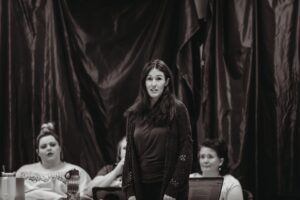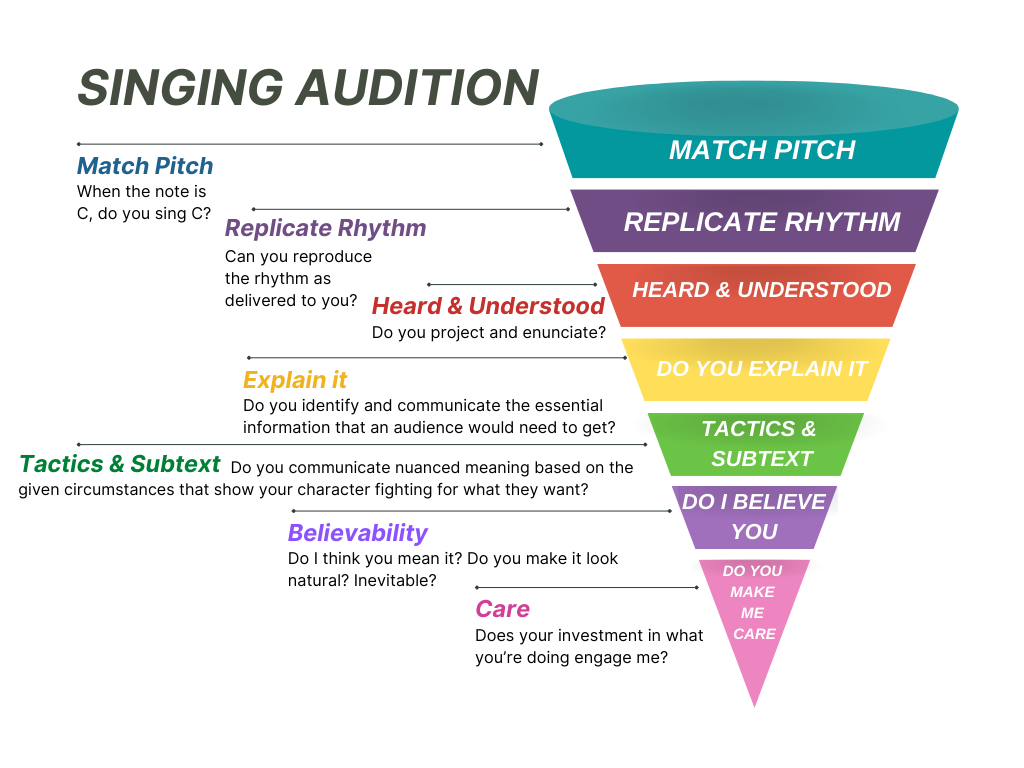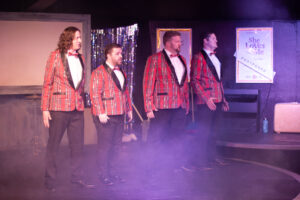
I’m getting ready to audition 70 students for a musical at the high school where I teach theatre. I also have a show I’m casting later this spring for a local theatre that calls for one man and one woman. So, I’ve been thinking about how I articulate what I’m looking for in the audition process. Let’s set aside some of the other important considerations of the casting process for today and focus only on the singing piece of a musical theatre audition.
The word “talent” gets thrown around a lot, but I think it’s a fairly useless word. What do we even mean by it? What does it look like? I much prefer the “talent” part of the casting process to be called skills. I am looking for skills, specific ones. Below is my best effort at enumerating the singing skills I am hoping to identify in each person who walks in to audition for me.
Disclaimer: This is where I am at in my creative process right now. I expect to evolve in my understanding and practice until I die. I’m thinking out loud and speaking in draft and I reserve the right to revise and amend. Also, I’m only speaking for myself. Different artists have different approaches and that’s a fantastic thing. I’m not implying that there is one way and this is it.

Music Literacy
Perhaps a weakness of this original infographic is that I didn’t mention anything about musical literacy. I think the ability to read sheet music is enormously helpful. But I’ve gone back and forth with myself about if it’s essential. As long as the singer can do what the sheet music instructs efficiently enough to be prepared and progress in time with the rehearsal process, I don’t think it really matters how. If they are reading the sheet music, hiring a pianist to plunk things out, taking songs to a voice teacher, recording the rehearsals, or some combination of the above, they can do whatever works for them and gets them ready.

When I directed The Pirates of Penzance, the music director Anthony Buck and I structured the singing callback to get a sense of the music literacy levels of our auditioners. It’s an operetta and fairly challenging music for some of the roles. We would be rehearsing over the summer so our best guess going into auditions was that we would need musically literate leads because we wouldn’t be able to offer them the rehearsal time for repetition and teaching by ear. I don’t approach every show or every role like that though. I’m about to cast Guys and Dolls and if it weren’t for the fact that this is in an educational setting and I want to increase the skills of my student cast with every show they do, I don’t think there is a single role where I’d care about music literacy. It just depends on the circumstances.
Timbre
There’s also nothing on this infographic about timbre–the character or quality of a musical sound or voice as distinct from its pitch and intensity. There are times when I have the option of caring about a specific type of vocal sound; when there are enough auditioners displaying enough skills that I can be selective in that regard. I would fold timbre into believability though–does this sound seem like it would come from this type of character? I’ll hopefully go more in-depth on “types” in a future post because I have a lot of bones to pick with that concept, but basically, there are likely to be some text-based implications and audience expectations about timbre that I should consider and be intentional about.

Jekyll & Hyde is a Frank Wildhorn piece that has power ballads for two of the three leads and, since the role of Lucy was originated by Linda Eder, fans of the piece will likely have expectations of a rich, powerful, and slightly sultry soprano timbre. I don’t have to cast it that way if I have other ideas, but it’s important to me that I consider what the music is leading me toward and what the audience might expect.
I love subverting audience expectations when it’s the natural result of directorial choices I care about and equally justifiable based on the text.
The Ineffable “Do I Like It?”
There’s also nothing on the infographic about whether I “like” the voice or not. That’s because I’m not sure what I mean by that and I don’t often think I care about it. I’m not convinced it’s separate from the other things I’ve already listed in skills or not a coded reliance on type-casting. I suspect that when I say “I like it” or “I don’t like it,” I’m just taking a shortcut from thinking or articulating specifically what created my overall impression. Causal thinking is the process of identifying the relationship between a cause and its effect, or causality. It’s something I enjoy and find useful. If I am having trouble engaging in that or being sluggish about it, then I might use “liking” or “not liking” as a crutch. But I think it’s lazy of me, and I try to correct it.
So What Should a Singer Do?

So, what should a singer do in preparing to audition for me? The answer isn’t surprising. They should prepare so they can demonstrate their skills to the best of their ability. Then they should recognize that some of the key ingredients in my casting are out of their control. I have not cast incredibly skillful singers before and I have given leads to less skillful singers. The weight I assign to any given element of casting can fluctuate between situations, roles, and productions. It’s utterly impossible to forecast how casting will go. But I’m always looking for skills. I remember seeing skills and who possesses them. I love working with skillful people. Showing skills will never hurt you, even if it can’t outweigh other important considerations. And, hopefully, this post makes a little more clear, for myself, my students, and anyone else interested, what skills I value in musical theatre singing.
